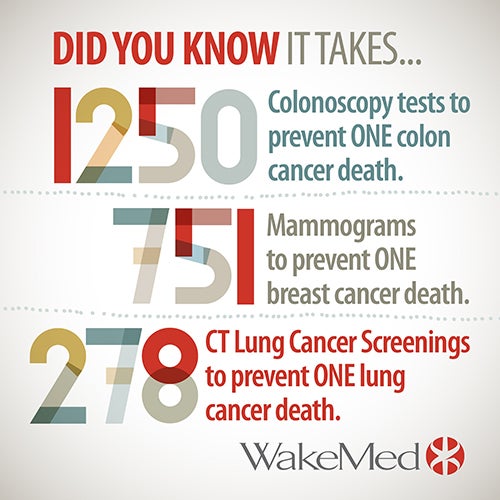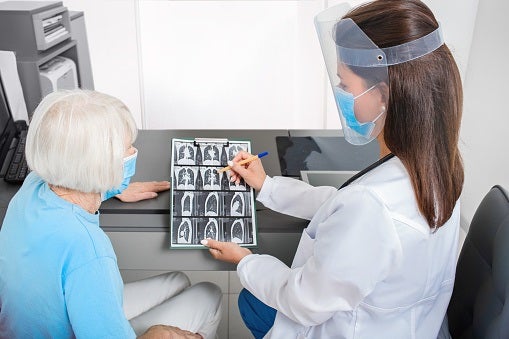Are you at risk for developing lung cancer?
October 24, 2024
By: WakeMed Health & Hospitals
Categories: Cancer Care, Pulmonology
Medically reviewed by Kevin Davidson, MD, WakeMed Pulmonology & Critical Care
Lung Cancer – The Deadliest Cancer in the U.S.
Screening & Early Detection Are Key
While lung cancer is only the third most common cancer in the United States behind skin and breast cancer, what most people don’t realize is that more people die in the US from lung cancer than from any other form of cancer. Unfortunately, because of a lack of awareness and screening, most people don’t know they have lung cancer until it has spread/already advanced. Early detection through a lung cancer computed tomography (CT) screening exam could help save your life. Fortunately, getting a potentially life-saving screening is easier than ever at WakeMed.

Why Should You Get Screened?
When it comes to preventive screenings for cancer, colonoscopy and mammography are standards of care. While CT lung cancer screening is gaining momentum, many are still unaware of its benefits.
Here’s how the screening compares in terms of detection:
- If you are determined to be at high-risk for lung cancer, early detection can save your life and has been tied to significantly better outcomes/survival rates. If you’re interested in screening, talk to your health care provider.
- Unfortunately, 3 out of 4 patients with lung cancer have incurable, locally advanced or metastatic disease at the time of diagnosis, leading to poor survival rates.
- When lung cancer is detected at its earliest stage and removed, survival rates are around ten times better than those diagnosed with Stage IV disease.
How to Understand Your Risk
While most people think of smoking as the only risk factor for lung cancer. The truth is between 10 and 20 percent of cases are in individuals who have never smoked. Aside from smoking, risk factors for lung cancer include secondhand smoke, family history of lung cancer, radiation therapy to the chest and exposure to other substances, such as arsenic, asbestos, diesel exhaust, radon, among others. It’s important to note that several regions of NC are known to have higher levels of radon.
What is a CT Lung Cancer Screening?
A CT scan uses X-rays to produce detailed cross-sectional images of the lungs. It’s the preferred method for detecting lung cancer because it’s better than a regular x-ray at finding lung tumors and showing them clearly – more so than a traditional chest X-ray.
If you fit the criteria listed below, you are likely to qualify and benefit from a low-dose CT Lung Cancer Screening. To learn more, talk with your primary care physician about the risks and benefits of this valuable screening tool if you…
- Are between the ages of 50 and 80 years old
- Are a current smoker or previous smoker who has quit within the past 15 years
- Have a smoking history of at least 20 pack-years (one pack a day for 20 years, or two packs a day for 10 years)
The test is extremely simple and non-invasive, requiring no contrast dye. Patients are fully clothed during the exam.

What are Possible Signs/Symptoms of Lung Cancer?
If you have any of the following symptoms, you are not a current candidate for lung cancer screening, but you should make an appointment with you doctor to discuss your symptoms:
- New or changing cough that doesn’t go away or gets worse
- Shortness of breath that you’ve never felt before
- Productive cough with blood
- Unexplained weight loss or loss of appetite
- Chest pain (that is often worse with deep breathing, coughing or laughing)
- Infections, such as bronchitis and pneumonia that don’t go away or keep coming back
- Feeling tired and/or weak
How do you schedule a CT Lung Cancer Screening?
A CT lung cancer screening requires a physician’s order. Therefore, you are encouraged to discuss the benefits of a lung cancer screening with your primary care physician. Once your physician has ordered the screening, you can schedule an appointment with your imaging provider of choice (after your physician has ordered the screening).
How Can Quitting Smoking Reduce Your Risk?
Many of those at risk for lung cancer are smokers who need help to quit. While quitting a habit is never easy, there are many resources available to help. From over-the-counter therapies and prescription medications to tobacco cessation programs, getting the help you need is a great place to start. You can talk to your provider about our Quit With WakeMed Tobacco Cessation Program, call 1-800-QUIT-NOW or visit the NCQuitLine.
About Kevin Davidson, MD
Dr. Kevin Davidson is a board-certified physician in five disciplines. He joined WakeMed after training at University of Colorado and National Jewish Health, a top-ranked Pulmonary & Critical Care fellowship. He completed additional fellowship subspecialty training in Interventional Pulmonology. “This training allows our team to perform minimally invasive procedures for disorders of the lungs and chest as well as therapies for a large array of pulmonary problems.” Dr. Davidson works in our intensive care units, pulmonary clinics, and performs advanced pulmonary procedures.
Dr. Davidson’s philosophy is to empower patients and their families with the detailed information and medical knowledge needed to help them understand and gain control over their own health. Twice he has been recognized by the Gold Humanism Honor Society for compassionate care towards patients. “I often meet patients when they are faced with uncertainty and difficult circumstances. I seek to get rapid safe answers for patients and provide exceptional care." Dr. Davidson has also spoken nationally about public health concerns. He has appeared on CNN and MSNBC and has also been interviewed by the Washington Post and Wall Street Journal regarding respiratory medicine and public health. He serves as a peer reviewer of scientific and clinical research and participates in medical education. Outside of work, Dr. Davidson lives in the Triangle with his wife and children. When not at work, they enjoy spending time outdoors with their dog Juniper.
Sources:
- Richardson A. “Screening and the number needed to treat.” J Med Screen. 2001;8(3):125-127.
- Kaktki HA, Kovalchik SA, Berg CD, et al. “Development and validation of risk models to select ever-smokers for CT lung cancer screening.” JAMA. 2016;315(21):2300.
- Aberle DR, Adams AM, Berg CD, et al. “Reduced lung-cancer mortality with low-dose computed tomographic screening.” NLST Research Team. N Engl J Med. 2011;365(5):395.
- Environmental protection agency. Accessed online Oct 27 2020: https://www.epa.gov/sites/production/files/2015-07/documents/zonemapcolor.pdf